Semrush vs SpyFuIn today's highly competitive digital landscape, businesses are constantly looking for ways to stay ahead of the trend and outperform their competitors. Two popular tools that have emerged as powerful solutions for digital marketers are Semrush and SpyFu. Both tools provide a range of features and insights for improving your search engine ranks, market presence, and PPC campaigns, as well as researching your competitors' strategies. While Semrush and SpyFu share some similarities, they also have distinct differences that set them apart from each other. Choosing the right tool can make all the difference in achieving your marketing goals and driving growth for your business. 
In this article, we'll take a deep dive into Semrush and SpyFu, exploring their features, pros, and cons to help you make an informed decision on which tool is best suited for your business needs. Whether you're a seasoned digital marketer or just starting out, this comparison will provide you with the insights you need to make the most of your marketing efforts and gain a competitive edge in your industry. What is Semrush?Semrush is a potent SEO tool that delivers comprehensive website research and aids companies in their search engine optimization initiatives. It offers in-depth information on a variety of topics, including keyword research, backlinks, organic traffic, and competition analysis. Companies can simply track their progress with Semrush and make wise choices to enhance their internet visibility and increase website traffic. It is the perfect option for both small and large enterprises due to its user-friendly layout and customizable reports. Semrush Pros
Semrush Cons
What is SpyFu?SpyFu is a powerful keyword research and competitive analysis tool that allows users to uncover their competitors' online marketing strategies, including their top organic and paid keywords, backlinks, and ad copy. It also provides insights into their search engine rankings, domain strength, and PPC budgets. For those looking to start their career or research in the field of Digital Marketing and SEO, SpyFu can be a great solution. SpyFu Pros
SpyFu Cons
Semrush vs SpyFu: What are the differences?
Comparison of Specific Features for Semrush and SpyFuLet's examine the features of Semrush and SpyFu in-depth to contrast what each one has to offer and determine which platform is actually superior. 1. Keyword ResearchSemrush excels at keyword research. It features one of the most complete sets of tools for conducting keyword research, claiming the largest keyword database of any platform. There are several essential components of Semrush's keyword research toolkit, including:
Even though Semrush's database is twice as large, SpyFu also offers a wide range of keyword research tools. The two crucial tools include:
Keyword Overview The keyword overview tool, which is used for analyzing keywords, is a feature that both tools share. It's not difficult to understand how to use this function even if you have never done it before. Semrush and SpyFu both have a search bar on the main page. All you have to do is put in the term you want to analyze in the search bar and select a country from the drop-down box to start the research. Below are the images from Semrush and SpyFu shown in a sequence: 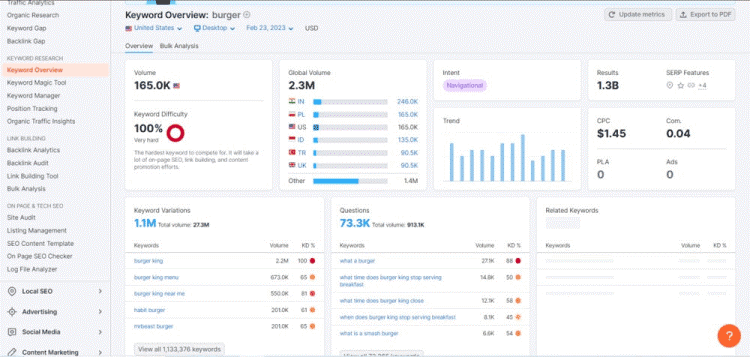
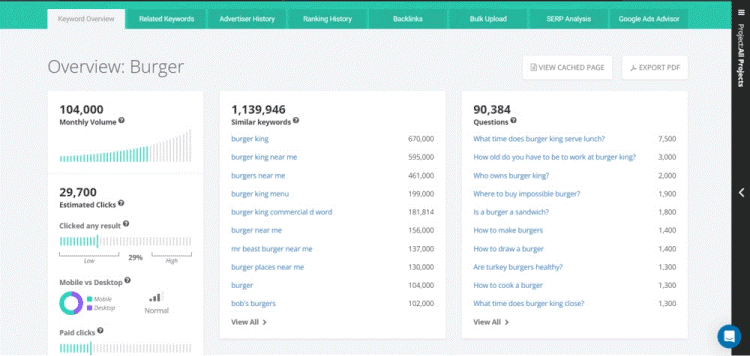
The data that both tools provide?keyword volume, related keywords, anticipated clicks, and CPC?is the exact same. Semrush's Keyword Magic Tool/ SpyFu's Related Keywords The Keyword Magic Tool from Semrush is the best option if you're seeking fresh keyword suggestions. There are more than 21 billion keywords in it. 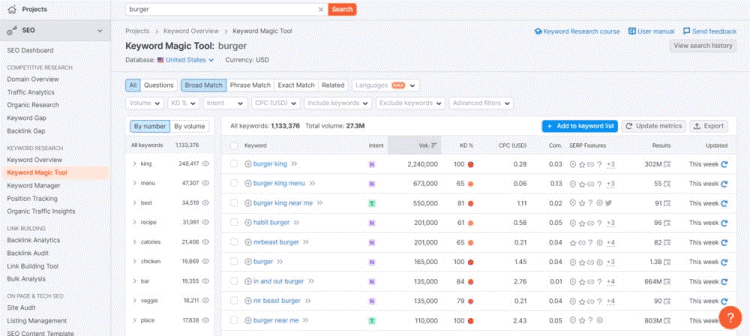
In order to focus your results, it also provides a variety of filters. Phrase match, broad match, precise match, or similar are all possibilities that you may choose from. This keyword tool also lets you implement sophisticated filters. 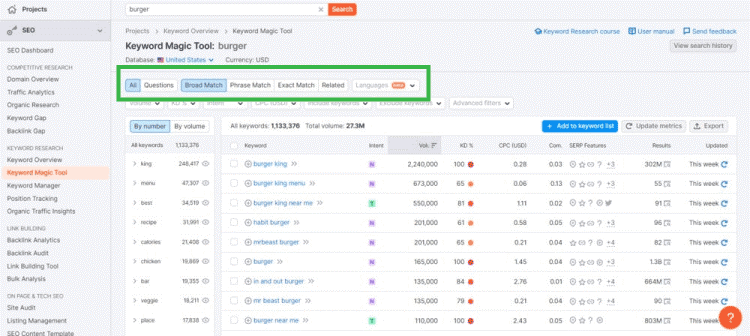
Similar functionality may be found in SpyFu's Related Keywords tool. 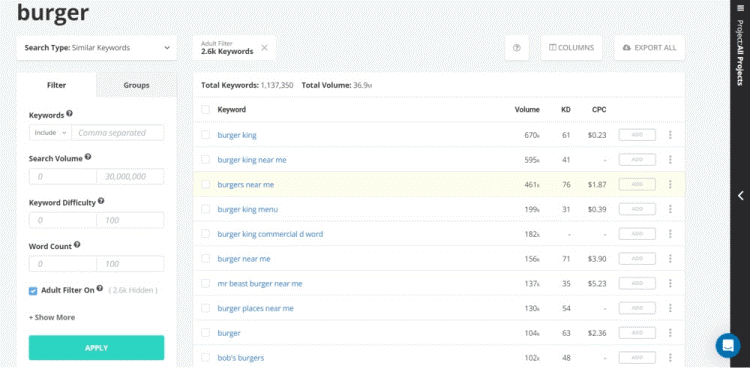
You'll get comparable results after doing a search on both, with the exception of a few more related terms that Semrush found in higher numbers than SpyFu did, like "Burger King Menu". Except for accuracy, both tools are similar and offer an equivalent variety of filters. Semrush's Keyword Manager/ SpyFu's Bulk Analysis Are you looking to organize your keywords? Semrush's Keyword Manager is useful in situations like that. You may compile a list of pertinent keywords under one roof by using the keyword manager tool. Additionally, this list and keyword metrics can be exported to other tools. It may be exported as either an XLSX file or a CSV file. Below is a screenshot showing how the Keyword Manager from Semrush appears: 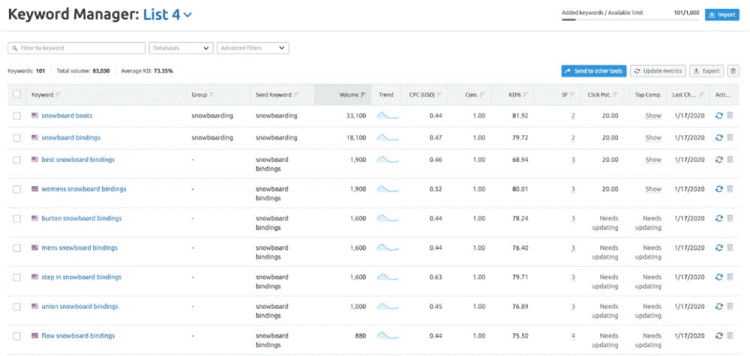
While SpyFu doesn't have a tool quite as good as Semrush's Keyword Manager, it does have a bulk upload feature that lets you create lists of keywords up to 1000 words long that can be exported to other platforms or SpyFu's own project manager. 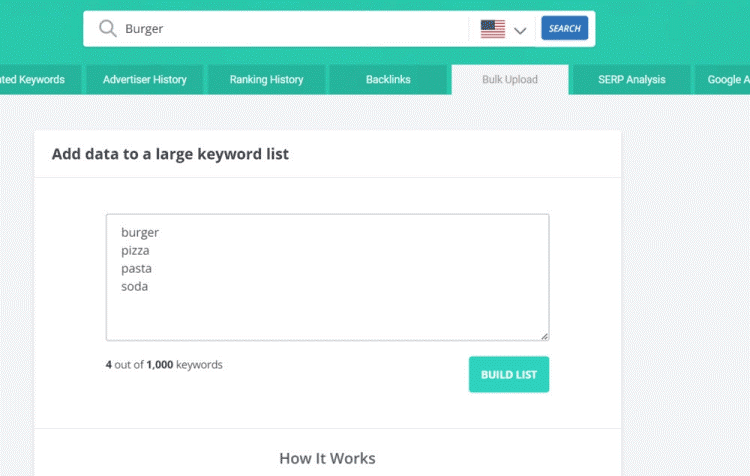
The Insights from Semrush's Organic Traffic The tool that only Semrush provides, Organic Traffic Insights, allows you to learn more about your organic traffic. SpyFu does not offer any feature similar to Semrush's organic traffic. 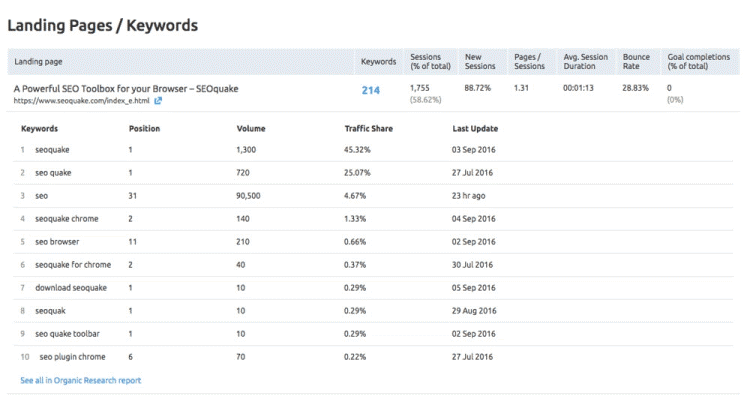
When it comes to keyword research, Semrush is superior to SpyFu mostly because the data is more accurate. Semrush succeeds due to regular updates, a considerably bigger keyword database, and a fantastic SEO Toolkit. 2. BacklinkingSeveral modern link-building tools are available from Semrush. Although they are very feature-rich, it might take some time for you to fully understand them. The Semrush tools listed below for backlink analytics are worth looking into:
On the other hand, there are just 3 backlinking tools available on SpyFu. They are:
Let us now compare the backlink tools of both Semrush and SpyFu: Semrush's Backlink Analytics / SpyFu Backlinks Any referring internet pages, as well as the anchor text for backlinks to your website, are provided by Backlink Analytics. Furthermore, you can examine your authority rankings, follow links, no-follow links, and other metrics. In comparison to SpyFu, Semrush offers much better backlink analytics. Unlike Semrush, which provides a remarkably thorough examination of backlinks, SpyFu simply provides a list of high-quality backlinks associated with your website. It also displays all websites that link back to you, your authority score, the sorts of backlinks coming from those websites, the authority ratings of the domains referring to you, and any new or lost domains. Semrush's Backlink Audit Examining your backlink profile is possible using the Backlink Audit tool. A backlink auditing feature is absent on SpyFu. It's simple to keep track of your backlinks using Semrush, which also provides toxicity levels for each link to assist you in identifying and getting rid of bad backlinks. Semrush's Backlink Gap/ SpyFu's Keyword Backlink You may compare the backlink profiles of five different websites at once with Semrush's Backlink Gap tool. All you have to do is type in the domain names (URLs) of the websites. Semrush compiles a list of every referring domain that links to them based on that information. You may locate websites that connect to your rivals' websites but not to your own using the filtering feature in the tool. Overall, it becomes simple to spot differences between your strategy and those of your rivals. The SpyFu Keyword Backlinks tool is not too complicated. You type a keyword into the box, and it provides you with a list of backlinks that may help rank that term, as well as some basic statistics like domain strength and monthly organic clicks. 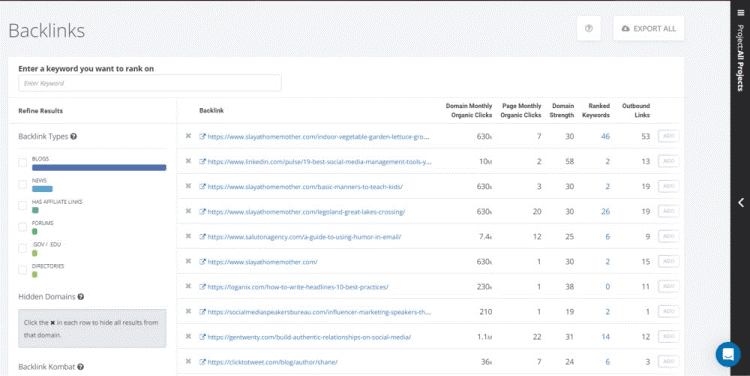
Semrush is unquestionably the winner when it comes to backlinking. In addition to outperforming SpyFu's backlink analytics, Semrush's backlink auditing tool is a superb tool for determining the significance of domains referring back to you. 3. Rank TrackingWith both tools, you may keep track of your site's daily ranks for a few chosen keywords by using rank tracking. Additionally, you may choose which devices or locations should be tracked. Position Tracking for Semrush and Spyfu's Ranking History Both Semrush and Spyfu provide rank-tracking tools that are extremely similar to one another. These programs provide analytics of the keywords or pages on your website, as well as information on their past and present rankings on SERP. Below are the images from Semrush and SpyFu, respectively: 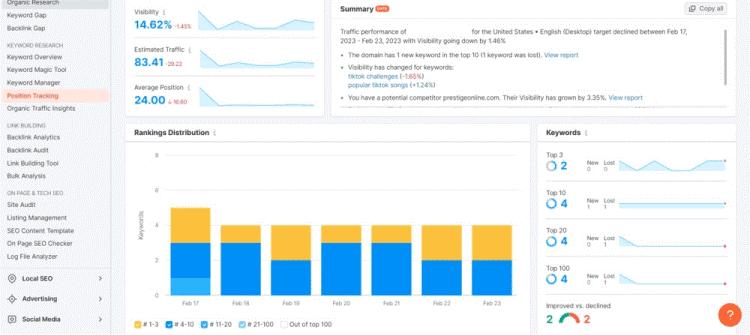
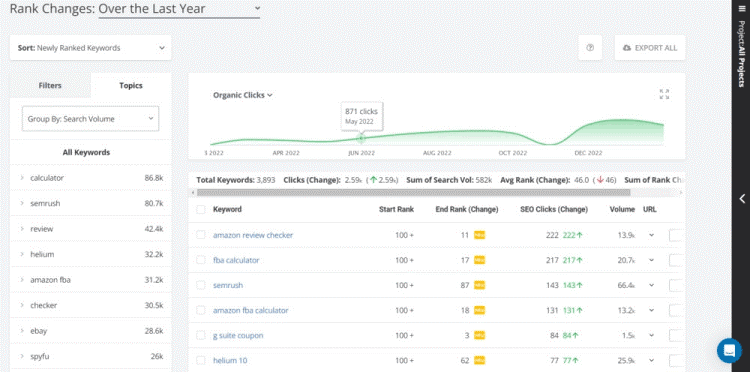
Both tools allow you to adjust the location of keywords, but Semrush is better since it offers visibility, traffic estimation, and an average position bar on the top-left side. If you need a brief summary of your performance, such figures are fantastic. Although lacking a visibility score, SpyFu still provides an appealing graph that displays organic clicks and a tiny little bar that displays the average keyword position. When examining ranking positions, there are different filters and sorting options available on SpyFu, compared to how few there are on Semrush. 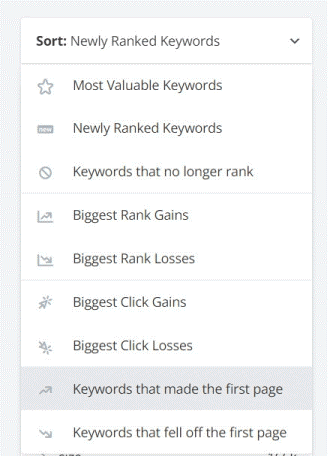
In light of this, it is essential to keep in mind that, as you can see below, Semrush regularly changes ranks; in fact, the rankings shown below were just compiled three hours ago. This shows that Semrush updates the data frequently and changes the position of the tracked keywords accordingly. 
In this way, Semrush has won overall. 4. PricingBoth tools offer various pricing plans with different features and functionality. Here's a comparison between the two tools based on pricing: Semrush Pricing Semrush offers three main pricing plans - Pro, Guru, and Business - ranging from $119.95 to $449.95 per month. Each plan provides access to a different set of features and limits the number of projects, keywords, and reports that can be created or accessed. Semrush also offers a free plan with limited features and functionality. SpyFu Pricing SpyFu also offers three notable pricing plans - Basic, Professional, and Team - ranging from $39 to $299 per month. Each plan provides access to different features and limits on the number of keyword searches, domain searches, and reports that can be created. Like Semrush, SpyFu also offers a free plan with limited features and functionality. Overall, SpyFu is generally more affordable than Semrush, especially for smaller businesses or individuals. However, Semrush offers more features and functionality overall, and it may be worth the investment for larger businesses or agencies that require more advanced SEO analysis tools. It's important to evaluate your specific needs and budget before choosing one over the other. 5. PPC AdvertisingAnother strategy for increasing visitors is pay-per-click marketing, which involves paying for sponsored advertisements to appear on websites and search engines like Google. This usually results in the term "Ad" being shown next to your content, and it is positioned above the other articles. 
It may appear that you don't need to bother about SEO since you'll always appear in the top place on the search results page, but that's not the case. The necessary keyword research, high-quality content, and competitive analysis are all required. The main benefit of PPC marketing is that because you paid for the article's placement, you now have an assurance that readers will actually click through to read it. To do this, it is essential to make sure that your ad employs the right keywords so that search engines can display it to the right audience. A PPC keyword tool is required for this. Both SpyFu and Semrush offer PPC keyword tools that function similarly. You may use these tools to uncover keywords that are relevant to your industry and those your rivals may have utilized as well. It resembles the standard keyword tool in appearance, but it additionally receives data from a linked Google Ads account. Below are the images from Semrush and SpyFu's PPC keyword tools, respectively: 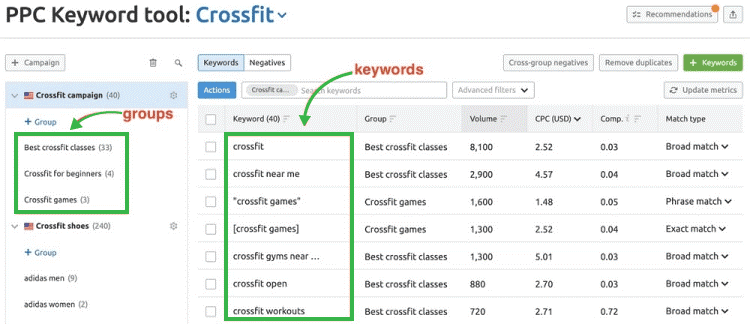
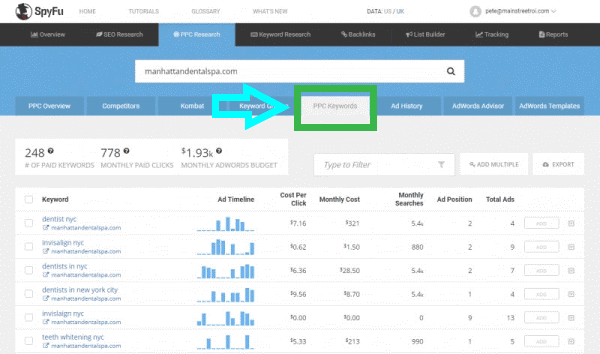
Both tools also provide an ad history feature that shows all prior ad performance data so you can see which advertisements were successful and which ones weren't. SpyFu's primary distinction is that it isolates ad history from Google Ad history, which is helpful if you're managing numerous campaigns yet want to identify your Google Ad campaigns through your associated Google Ads account. In this way, SpyFu has won overall. Semrush can't compete with SpyFu in this category since SpyFu is primarily geared toward competition analysis. Its PPC research toolbar is stocked with resources to assist you in tracking your PPC campaigns, researching those of your rivals, finding keywords for them, and creating Google Ad campaigns using its template builder. SpyFu triumphs in this area as a result. Which tool should you choose, Semrush or SpyFu?Although there is some overlap between Semrush and SpyFu, there will be scenarios when one tool is more important than the other. Since both tools have pros and cons in specific areas, one needs to choose based on the target requirements. Generally, one may consider the following factors: When should Semrush be used?As an all-in-one tool, Semrush is just what it claims to be. Even while Semrush has a strong emphasis on SEO, which is by far its finest feature, it continues to be an all-rounder, never really specializing in one field over another. For novices and small enterprises, it is the ideal tool because of this. Owning Semrush implies you won't require many additional tools, despite the fact that it is a little more expensive than SpyFu. You have a tool at your fingertips that can evaluate the technical, off-page, and on-page SEO of your website as well as give data and competitive analysis. When should SpyFu be used?SpyFu offers some decent SEO tools, but it still falls short of Semrush. Its keyword database is less than half that of Semrush's, and its backlink analyses aren't as thorough. However, in competition analysis, and particularly in its PPC analytics, SpyFu is somewhat one step ahead when compared to Semrush. Its analytics and ad campaign tools are among the finest if you're focusing on pay-per-click campaigns.
Next TopicSE Ranking vs Semrush
|
 For Videos Join Our Youtube Channel: Join Now
For Videos Join Our Youtube Channel: Join Now
Feedback
- Send your Feedback to [email protected]
Help Others, Please Share










